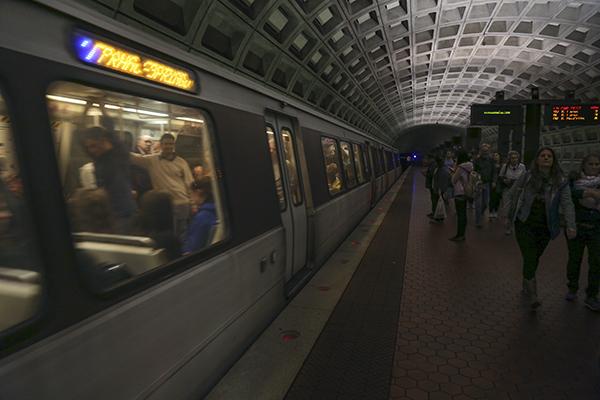Updated: April 4, 2016 at 11:15 a.m.
Students will keep paying regular prices for the Metro next year.
GW will not create the current version of a discounted Metro pass for students that would allow them unlimited access for a yearly fee, a University spokeswoman said last week. For months, student leaders negotiated with administrators and Metro officials, and in March, 73.5 percent of students voted in approval of the measure during Student Association elections.
Students would have paid for the pass with a mandatory $250 fee added to their tuition bill.
University spokeswoman Maralee Csellar said in an email that asking students to pay this amount would not be “feasible or fair.”
“We are committed to continuing to work with WMATA to identify a more affordable option for those students who utilize public transit on a regular basis,” she said.
Csellar said students should be given choices for cheaper Metro travel, and GW and WMATA have been attempting to work out an agreement for a low-cost option for 10 years.
SA President Andie Dowd said in an email that both the SA and the University want to provide affordable options for public transportation for students, and they will continue to talk with WMATA about options for an opt-in policy.
“Throughout the past year, the Student Association has emphasized affordability, and that is one of our top priorities when working on this,” she said.
The decision to not back student opinion on the discount is not the first time officials have ignored the results of a referendum vote. Last year, 70 percent of students voted to cut fossil fuels from GW’s endowment. In March, GW announced that they will not divest from fossil fuels.
A separate referendum last year to mandate sexual assault training at Colonial Inauguration received 92 percent support. GW initially required the incoming Class of 2019 to complete an online training module, but after many student leaders, including former Student Association President Nick Gumas and Executive Vice President Avra Bossov, spoke out insisting that the online sessions would not be as effective, officials agreed to require the training for all incoming freshmen once they arrived on campus in the fall.
WMATA has offered a discounted pass to several D.C.-area universities, including American University, which plans to put the pass in place for next year.
Dan Stessel, a WMATA spokesman, said Metro officials respected GW’s decision, and said they would be “ready to work with GW should their position change in the future.”
Casey Syron, the former executive vice president of the Student Association, lobbied to implement the pass as early as this fall for the incoming freshman class. He said he hoped returning students would be able to opt in if they choose. Syron stepped down from his position in January. He did not return a request for comment.
In February, sophomore Eve Zhurbinskiy, a commissioner on the Foggy Bottom and West End Advisory Neighborhood Commission, said at a WMATA Board of Directors meeting that she supported the idea of a discounted pass if it was optional for students.






